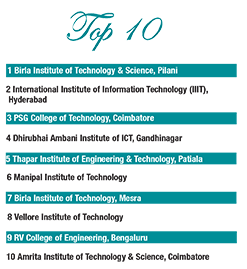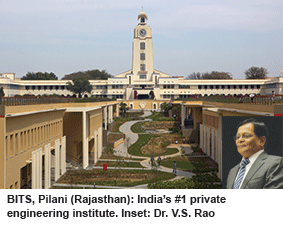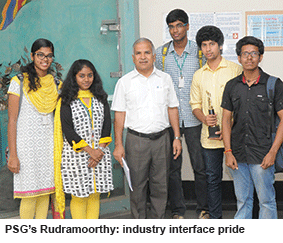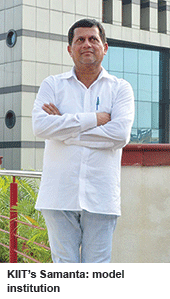India’s Best Private Engineering Colleges 2016-17
With the monotonously top-ranked IITs and NITs admitting a minuscule percentage of the estimated 1.3 million school-leavers aspiring for engineering education, and other government engineering colleges in a shambles, league tables of the country’s Top 100 private engineering colleges serve a very useful public purpose, here are India’s Best Private Engineering Colleges 2016-17: Summiya Yasmeen
 Engineering education in India is in deep crisis. An overwhelming majority of the 1.5 million graduates certified annually by the country’s 3,470 engineering colleges — the largest yearly cohort of engineering graduates produced by any nation worldwide — are unemployable. According to the Aspiring Minds National Employability Report 2016 released in early January, 80 percent of the country’s engineering graduates are inadequately skilled for industry. An earlier 2011 report of NASSCOM (National Association of Software & Services Companies) estimated the unemployability of engineering graduates at 83 percent. It ascribed the poor employability of India’s engineering graduates to inadequate knowledge of English (the medium of instruction) and communication skills, inadequate domain knowledge, and deficient technical skills.
Engineering education in India is in deep crisis. An overwhelming majority of the 1.5 million graduates certified annually by the country’s 3,470 engineering colleges — the largest yearly cohort of engineering graduates produced by any nation worldwide — are unemployable. According to the Aspiring Minds National Employability Report 2016 released in early January, 80 percent of the country’s engineering graduates are inadequately skilled for industry. An earlier 2011 report of NASSCOM (National Association of Software & Services Companies) estimated the unemployability of engineering graduates at 83 percent. It ascribed the poor employability of India’s engineering graduates to inadequate knowledge of English (the medium of instruction) and communication skills, inadequate domain knowledge, and deficient technical skills.
The general consensus among informed academics is that the quality and unemployability crises in Indian engineering education have been precipitated and accentuated by indiscriminate licencing of engineering colleges by the Delhi-based All India Council for Technical Education (AICTE), the apex regulatory body for technical education. Over the past decade, the number of engineering colleges in the country has almost tripled from 1,511 in 2006-07 to 3,384 in 2013-14. The fallout of the wild mushroom growth of engineering colleges led by the private sector is excess capacity. In the academic year 2015-16, AICTE estimates that 50 percent of the total seats available (1.6 million) in engineering colleges were vacant countrywide, driving a large number of them to the edge of bankruptcy.
Against this backdrop of continuous decline in quality, in 2013 and 2014 EducationWorld published its first pan-India ranking of engineering colleges other than the seven pioneer Indian Institutes of Technology (IITs), which by common consensus are leagues ahead of other engineering colleges and monotonously top all media rankings. Given that barely 2 percent of the 1.3 million school-leavers who write the IIT-JEE (joint entrance examination) annually, are admitted into these elite institutes, your editors have ab initio felt that the public interest would be better served by eliminating the IITs from our rankings and comparing the remainder inter se.
Taking this reasoning a step further, this year we have eliminated all government-promoted colleges including the 30 Central government-funded National Institutes of Technology (NITs) and highly subsidised state government engineering colleges. Like the IITs, the 30 NITs admit a mere 16,000 students countrywide who write IIT-JEE annually, while the majority of state government engineering colleges offer pathetic education. Moreover, with almost 80 percent of the 3,470 engineering colleges promoted and managed by private edupreneurs, it makes good sense to evaluate the relative merits of the country’s Top 100 private engineering colleges to enable parents and students countrywide to choose from the best among them.
“The IITs and NITs are supported by massive Central government grants and resources and unsurprisingly dominate almost all national league tables of engineering colleges. At the other end of the spectrum are poorly funded state government engineering colleges offering sub-standard education. EducationWorld has done the right thing by eliminating all government colleges from this year’s survey, and instead ranking the Top 100 private engineering colleges. This will not only help parents/students to choose from among the best accessible engineering colleges but also spur the latter to upgrade and improve. With many private engineering colleges reporting student vacancies and some in Andhra Pradesh and Tamil Nadu shutting down, there’s growing quality consciousness within the private sector, with managements realising that there’s no alternative to raising teaching and research standards,” says Dr. R. Natarajan, former chairman of AICTE.
 To choose the best 100 among India’s privately-promoted engineering/technology colleges, we once again commissioned the Delhi-based Centre for Forecasting and Research Pvt. Ltd (C fore, estb.2000), one of the country’s premier market research and public opinion polling companies. Over the past nine years, C fore has repeatedly conducted not only the unprecedented EducationWorld India School Rankings and EW India Preschool Rankings, but also university, college and B-school rankings which have been widely appreciated by the student, parents and academic communities.
To choose the best 100 among India’s privately-promoted engineering/technology colleges, we once again commissioned the Delhi-based Centre for Forecasting and Research Pvt. Ltd (C fore, estb.2000), one of the country’s premier market research and public opinion polling companies. Over the past nine years, C fore has repeatedly conducted not only the unprecedented EducationWorld India School Rankings and EW India Preschool Rankings, but also university, college and B-school rankings which have been widely appreciated by the student, parents and academic communities.
To conduct the inaugural EW India Private Engineering Colleges Rankings 2016 survey, 50 C fore field personnel fanned out across the country to interview 1,247 faculty and 1,342 final year students of 100 engineering colleges who were asked to rate them on seven parameters of academic excellence given differing weights viz, competence of faculty (weight: 350), faculty welfare and development (200), research and innovation (300), pedagogic systems and processes (250), industry interface (300), placements (200), and infrastructure and facilities (300).
“The sample respondents were quizzed according to a structured questionnaire and asked to rate institutions of which they were aware on the seven parameters. Care was taken that not more than one member of each institution was polled and ratings which faculty gave to their own institutes were disqualified. Low-profile institutions rated by less than 25 respondents were eliminated from the rankings,” says Premchand Palety, the promoter-chief executive of C fore.
In the EW India Private Engineering Colleges Rankings 2016, the Birla Institute of Technology and Science, Pilani (Rajasthan) and the International Institute of Information Technology, Hyderabad (IIIT-H) have been voted India’s top two private engineering colleges. It’s pertinent to note that BITS, Pilani and IIIT-Hyderabad were ranked #1 and #2 respectively in EW’s all-inclusive 2013 and 2014 league tables of India’s best non-IIT engineering colleges. Moreover the BITS, Pilani-Hyderabad campus is separately ranked #12 and Goa campus #22 in this year’s Top 100 private engineering colleges league table.
However, in the concurrently conducted EW India Private University Rankings 2016 survey, BITS, Pilani (including Pilani, Hyderabad and Goa campuses) — a deemed university — lost its 2015 #1 spot to Manipal University (see p.50).
“Our #1 ranking validates and recognises the unique BITS model of higher education. We are one of the few universities which has an educational philosophy which establishes a dialectical link between theory and practice. Pure academics is supplemented by deep industry engagement through our Practice School, a work integrated learning programme which includes entrepreneurial leadership for students and industry immersion for faculty. The industry readiness of our students is reflected in our #1 rating on the placements parameter and 100 percent campus recruitment record. Our #1 rating on the infrastructure parameter is also justified. All BITS campuses are equipped with state-of-the-art infrastructure, and we have earmarked more than Rs.1,400 crore for infrastructure expansion of our three Indian campuses over the next few years,” says Dr. V.S. Rao, an alumnus of Andhra University and BITS, Pilani who starting teaching at his alma mater in 1974 and is currently the interim vice chancellor of this globally-benchmarked, pioneer private university.
The third spot in the EW Top 100 Private Engineering Colleges Rankings 2016 has been awarded to the PSG College of Technology (PSGCT), Coimbatore, which had been continuously rising in the previous inclusive league tables of best non-IIT engineering colleges from #11 in 2013 to #4 in 2014. Established in 1951, PSGCT is ranked among the Top 4 on the parameters of research, industry interface and placements.
we have been consistently ranked among the country’s top engineering institutions by several surveys. An excellent placement record, intensive applied research undertaken by our faculty, and strong interface with industry have boosted our reputation in recent years. In particular, we pride ourselves for experiential education and have established 40 centres of excellence in partnership with India Inc. Moreover, over 200 faculty are engaged in research and 600 research scholars are in our postgraduate programmes. Every year, more than 100 companies campus-recruit graduates at a start-up average salary of Rs.5 lakh with the highest salary package crossing Rs.20 lakh per annum this year,” says R. Rudramoorthy, principal of PSG College of Technology which offers 14 undergraduate and 22 postgraduate engineering and technology programmes to its 8,450 students mentored by 543 faculty.
Further down the league table of this year’s best private engineering colleges, Dhirubhai Ambani Institute of Information and Communication Technology, Gandhinagar has yielded ground and is ranked #4 while the Thapar Institute of Technology, Patiala has risen to #5 (#9 in 2014) as has the Manipal Institute of Technology to #6 (10). The Top 10 league table is completed by Birla Institute of Technology, Mesra (7), Vellore Institute of Technology (8), RV College of Engineering, Bengaluru (9), and Amrita Institute of Technology & Science, Coimbatore (10).
With the southern state of Tamil Nadu (516) and Maharashtra (370) hosting the largest number of private engineering colleges in the country followed by Karnataka (212), unsurprisingly, colleges sited in these three states dominate the national league table. Tamil Nadu has 19 private engineering colleges ranked among the Top 100, Maharashtra has 16 and Karnataka 15.
In sharp contrast, the eastern seaboard states of West Bengal, Bihar, Odisha, and Jharkhand (combined pop. 264 million) together boast an estimated 215 private engineering colleges, of whom only three are ranked in the Top 100 national league table. Among the well-reputed engineering institutes of eastern India is the Kalinga Institute of Industrial Technology (KIIT), Bhubaneswar, ranked #38 all-India, #2 in eastern India and #1 in Odisha. Promoted in 1992, KIIT, which was conferred deemed university status in 2004, is also ranked #14 pan-India and #1 in Odisha (pop.43 million), in the EW Private University Rankings 2016 (see p.50).
 “I am pleased to learn that KIIT is ranked Odisha’s #1 engineering university. Over the past 23 years since it was promoted, KIIT has emerged as a model engineering and higher education institution of eastern India. Our #1 ranking is the outcome of investing in contemporary infrastructure, developing innovative pedagogies through our high-quality faculty, and research activities. All this is reflected in our 100 percent placement record with the salary offered to KIIT graduates averaging Rs.4.60 lakh per year and the highest going up to Rs.33 lakh. As a result of the excellent reputation we have built, there’s a huge rush for admissions — last year 250,000 students wrote our entrance exam for admission into 2,500 seats,” says Dr. Achyuta Samanta, founder of KIIT University, which has an enrolment of 27,000 students.
“I am pleased to learn that KIIT is ranked Odisha’s #1 engineering university. Over the past 23 years since it was promoted, KIIT has emerged as a model engineering and higher education institution of eastern India. Our #1 ranking is the outcome of investing in contemporary infrastructure, developing innovative pedagogies through our high-quality faculty, and research activities. All this is reflected in our 100 percent placement record with the salary offered to KIIT graduates averaging Rs.4.60 lakh per year and the highest going up to Rs.33 lakh. As a result of the excellent reputation we have built, there’s a huge rush for admissions — last year 250,000 students wrote our entrance exam for admission into 2,500 seats,” says Dr. Achyuta Samanta, founder of KIIT University, which has an enrolment of 27,000 students.
The high quality of institutions included in the EW 2016 league table of Top 100 private engineering colleges is testified by the high state rankings of colleges not ranked among the national Top 20.
For instance, the Mumbai-based Vivekanand Education Society’s Institute of Technology, Mumbai, ranked #34 all-India, is top-ranked in Maharashtra (pop.112 million); the Faculty of Engineering & Technology of Manav Rachna International University, Faridabad is ranked #49 nationally, but #1 in Haryana (pop.25.3 million); and the Rajagiri School of Engineering and Technology, Ernakulam, ranked #65 pan-India, is ranked #1 in Kerala (pop.35 million).
Great pains have been taken to ensure this year’s league table of India’s Top 100 private engineering colleges helps aspiring engineering/technology students to shortlist, even if not choose, the most suitable colleges from among the best. Apart from national and state league tables, we also present Top 10 ratings and rankings under each of the seven parameters of academic excellence to help parents/students further narrow their search.
With Hemalatha Raghupathi (Coimbatore)














Add comment